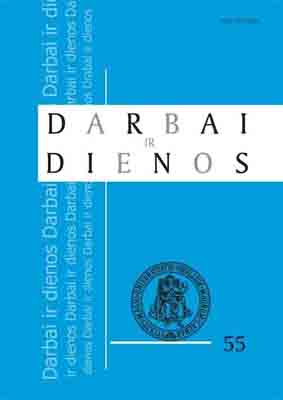Oficialioji Lietuvių kalba yra negyva kalba. Žurnalistai apie Lietuvių kalbos standartą televizijoje ir radijuje
Official Lithuanian is a Dead Language: Journalists about Standard Lithuanian on TV and Radio
Author(s): Loreta VaicekauskaitėSubject(s): Cultural Essay, Political Essay, Societal Essay
Published by: Vytauto Didžiojo Universitetas
Keywords: Lithuanian; language; kalba; TV; Radio
Summary/Abstract: Socialinių vertybių pokyčiai vėlyvosios modernybės visuomenėse palietė ir nusistovėjusias kalbos ideologijas. Ėmė keistis su kalbos atmainomis (tarmėmis, sociolektais, bendrine kalba) siejamos asociacijos, vertės, prestižas. Šie procesai lėmė, kad klasikiniai kalbos standartizavimo modeliai (plg. Haugen 1966), parenkantys, įtvirtinantys ir diegiantys „vieną geriausią“ kalbos atmainą, o likusias atmetantys kaip „blogesnes“, ėmė prarasti aktualumą (plg. Joseph 1987, Milroy 1985). Ideologinės permainos pirmiausia išklibino būtent bendrinės kalbos, arba vadinamojo konservatyviojo standarto, statusą. Bendrinėms kalboms, neabejotinai vaidinusioms lemiamą vaidmenį kuriantis nacionalinėms valstybėms, radosi konkurentų – kitų kalbos atmainų. Democratization processes in spoken media haven’t left Lithuania behind. However, besides bringing ordinary language into public space, they cause a crisis of official language ideologies. It’s characteristic for Lithuanian normative tradition to regard media as a tool for dissemination of standard norms and as a medium that propagates “correct” language with no exception. The gap between the conservative norm and the real usage has always been huge, but while Lithuania was a part of the Soviet empire the maintenance of the standard was possible with the help of systematic control of public space and monologue reading of texts. Nowadays TV and radio are still monitored and State Language Inspection issues fines to the journalists for their lexicon, grammar, and accentuation errors. Nevertheless, language ideologists report that “norms are falling apart” and the language “approaches the boundaries of degeneration.” At the same time, while being an object for prescriptive language planning, spoken media, using language as a working tool in a way that seems proper to them, act as a subject. The choice of language variety undoubtedly depends on the relevant attitudes. This article presents research into the attitudes of Lithuanian journalists in TV and radio.
Journal: Darbai ir dienos
- Issue Year: 2011
- Issue No: 55
- Page Range: 191-207
- Page Count: 17
- Language: Lithuanian

